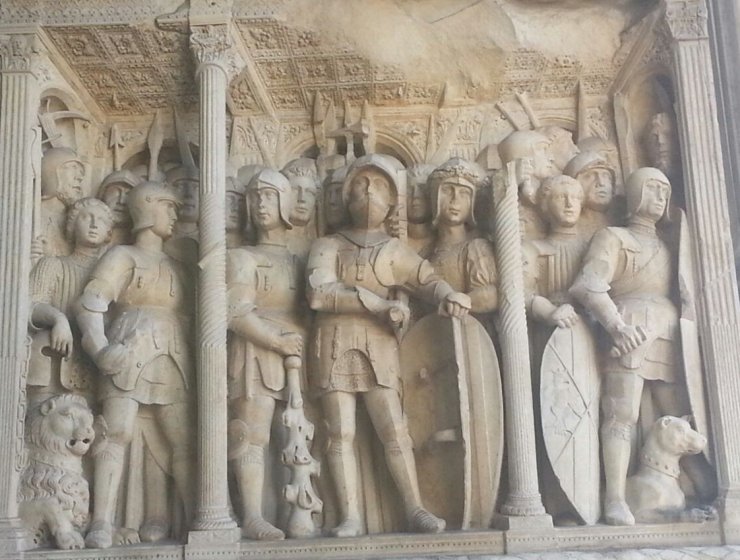
-Index-
Introduction
Antonio CORTIJO, Vicent MARTINES
Original title: Presentació
Writing, legitimacy and memory: slogans and badges of Alfonso V the Magnanimous (1416-1458)
Gema Belia CAPILLA ALEDÓN
Original title: Escritura, legitimidad y memoria: lemas y divisas de Alfonso V el Magnánimo (1416-1458)
Alfonso V the Magnanimous, King of Aragon (1416-1458), due to his linking to the Neapolitan throne and his role in the European policy of the Quattrocento, built a speech of his image to represent himself to his contemporaries and to the posterity. His purpose was to prove his legitimacy as heir to Naples, to appear to his contemporaries as the new princeps sponsored by the Italian Humanism and to remain in memory like a virtuous Caesar. This speech was composed of numerous and varied pieces ranging from the field of numismatics to Sigillography passing through the tilework or epigraphy, to name a few, and among which stand out from those containing motes and symbols denoting some specific qualities of the sovereign. Therefore, the aim of this article is to analyze the use made by the king of this slogans and badges and to restore their chronological and symbolic place in the political and cultural program designed by the Magnanimous.
The abolition of the right of ecclesiastical foreigners in Mallorca: attitudes and linguistic uses
Rosa CALAFAT VILA
Original title: L’abolició del dret d’estrangeria eclesiàstica a Mallorca: actituds i usos lingüístics
The Decree of Nova Planta (1707-1715) ends with civil alienation in the Catalan-Aragonese Crown and, by extension, in 1723, with ecclesiastic alienation in Aragon, València and Barcelona; but not in Mallorca, where it is preserved until 1808. Using unpublished documentary contributions based on the declarations of the councillors of the city of Palma in the plenary meeting of January 12, 1808, we analyze the reasons argued by the local authorities to continue with ecclesiastical alienation, as well as the arguments of those who, out of love for the new state, stood against it. The abolition of such right is placed within the framework of what dictates the royal cedula of June 23, 1768. We also review the significance for the extension of Spanish language in the dioceses of Barcelona and Palma, of the presence of two Andalusian bishops whose mandates coincided partially; namely, Gavino de Valladares (Barcelona, 1775-1794) and Juan Díaz de la Guerra (Palma, 1772-1777).
From Dream Fantasy to Spiritual Balance
Anna Isabel PEIRATS NAVARRO
Original title: De la fantasia del somni a l’equilibri espiritual
In this article we reflect on the meaning given to dreams in medieval literature. First, the dream is distinguished in the strict sense of the vision or dream revealing spiritual guarantee, which implies a change in behavior. From the sacred texts, the Bible and the Holy Parents, is reflected that the pleasing dream comes from the divine designs, while the bad dream has its origin in the evil one. The influence of sleep is a concern for all aspects of medieval society, to the point that moralists recommend being alert and not giving way to the influence of the dangers of the night. In the literature, from the experience of the Somnium Scipionis compiled by Macrobio in the sixth book of De Republica of Ciceron, or the romanic views of the Roman de la Rose, the relations regarding content, structure, form and rhetorical resources are recurring in works such as Il Corbaccio of Boccaccio, the Livre des Lamentations of Matheolus and the Spill of Jaume Roig.
The Mudejar as an art style: a historiographical appraisal
José GÓMEZ GALÁN
Original title: El mudéjar como estilo artístico: una valoración historiográfica
In this article, a detailed analysis of the historiography of Mudejar art is followed from the birth of the concept in the 19th Century until the present, in order to determine if it is possible to define Mudejar as an independent artistic style. The main points for and against this view are presented and analyzed using as a reference base the most important scientific works carried out in this respect, many of which offer varying interpretations regarding the subject. After the historiographical and epistemological critique, arguments are presented which defend Mudejar art as a singular artistic phenomenon while also giving recognition to the fusion of Christian and Islamic art elements which was the fruit of an intense transfer of cross-cultural knowledge. In this way, it is possible to speak of Mudejar as a cultural expression and an artistic style that emerged from a special geographical location at a unique historical time.
Que me podiesse lamar e sea daqui adelant principe de villena e de la otra tierra que jo he en el vuestro senyorio. Don Juan Manuel and the Crown of Aragon
José Vicente CABEZUELO PLIEGO
Original title: Que me podiesse lamar e sea daqui adelant principe de villena e de la otra tierra que jo he en el vuestro senyorio. Don Juan Manuel y la Corona de Aragón
This paper analyzes the relationship of the Manuel family (mainly through the nobleman Juan Manuel) with the Valencian domains of the King of Aragon through his properties in La Mancha and Murcia. These properties are studied from the time of the conquest of the Kingdom of Murcia by James II to Juan Manuel´s death in the mid-14th c. We also study the relationship between Juan Manuel and the kings of the Crown of Aragon regarding Castile within the context of contemporary Iberian historical event.
Nicolau Primitiu and his presidency in lo rat penat and proa. A personal story (1933-1935)
Alaitz ZALBIDEA BERENGUER
Original title: Nicolau Primitiu i llur presidència a lo rat penat i proa. Un relat personal (1933-1935)
This article aims to find, within the cultural and social context of the decade of the 30's, the ideal model of valencianist institution for the bibliòfil Nicolau Primitivo Gómez Serrano based on his diaries, specifically Dietari (1932- 1934) and Varia I (1934-1935), that coincide with his presidency in organizations such as Lo Rat Penat and Proa during the Second Spanish Republic, a period of Valencianist effervescence. The pages offer a new perspective, more personal and less “institutional” of the cultural history of the Valencian country, and more specifically, the events happened in the world of Valencianism and their institutions.


















































































